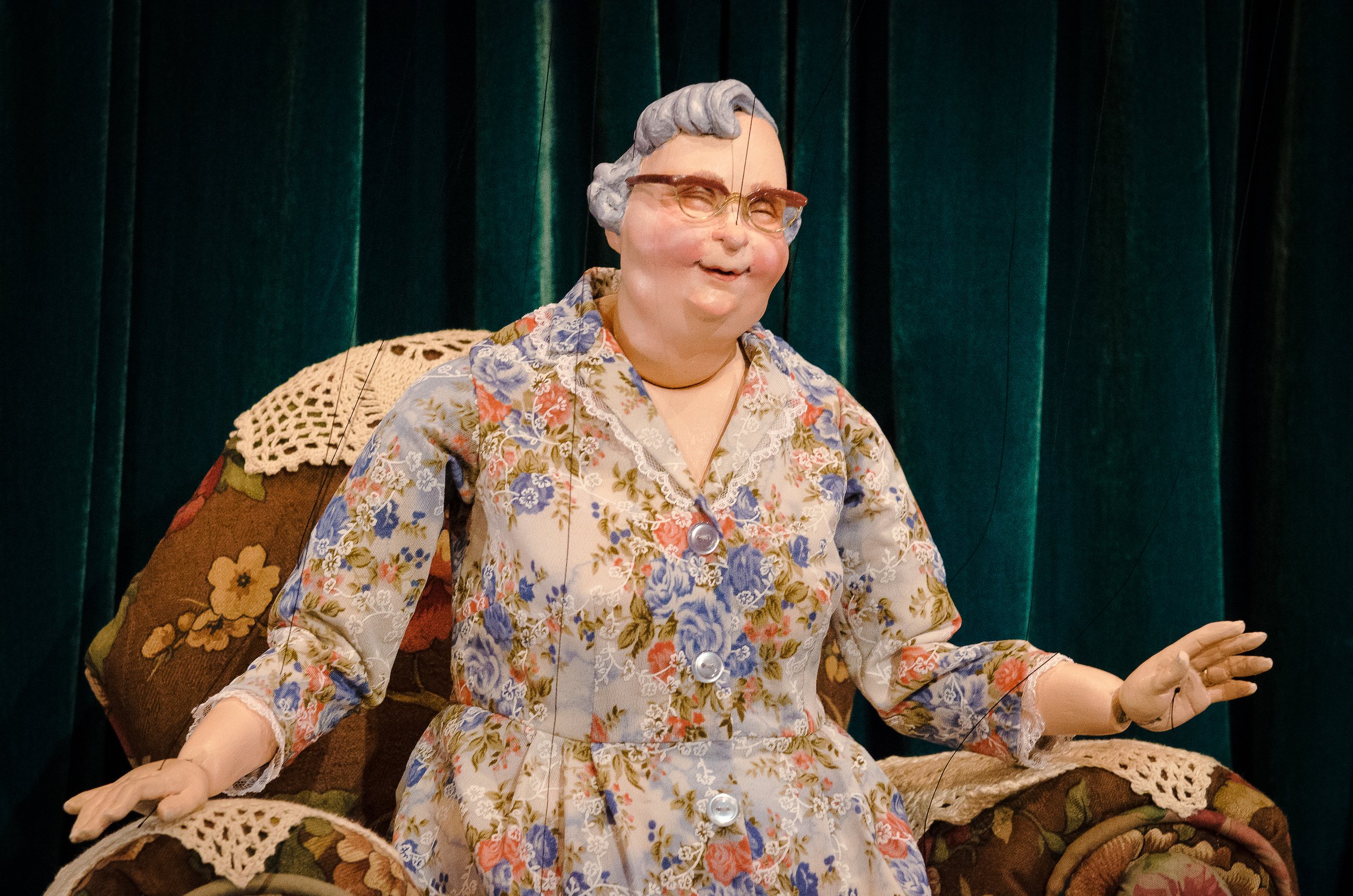Theatre review: Big laughs, colourful details in marionette master Ronnie Burkett's new Little Willy
The eccentric Daisy Theatre characters are back in over-the-top form, in a show that strays hilariously from Shakespearean satire
Photo by Alejandro Santiago
The Cultch presents Ronnie Burkett Theatre of Marionettes’ Little Willy at the Historic Theatre to January 29
THERE MAY BE over-the-top divas, aging theatre queens, and past-their-pull-date lounge singers to love in Ronnie Burkett’s deliciously deranged and laugh-out-loud puppet show Little Willy. But—sorry—the humble Mrs. Edna Rural is the standout. Watching her extended monologue about love and marriage, the audience was rapt on opening night. Perfectly outfitted in her “Sears housedress” and orthopedic Naturalizers—open-toed to dress up for the occasion—the Turnip Corners, Alberta farm wife is the kind of lovingly detailed caricature that only Prairies-raised Burkett could conjure. Warmly familiar, she spins yarns about everything from NeoCitran-spiked lemon loaf to the secrets of her 62-year marriage.
What does that have to do with Romeo and Juliet, which the Toronto-based puppet master is supposedly parodying in Little Willy? Well, as Burkett predicted at his raucous world premiere this week, “I can see the reviews now: ‘It has nothing to do with Shakespeare!’” And, indeed, this is an adult puppet show with beyond-wayward tangents—from quirky storytelling to bawdy interactions with audience members, and even a marionette striptease. What will resonate with Burkett fans is the fact that all their favourite, eccentric characters from The Daisy Theatre—the ones that first won over Vancouver audiences en masse in 2013—are back in fine form. That includes Esme Massengill, who schools the crowd on how to cheer her stage entrance, and little Schnitzel, the nonbinary fairy who longs to play both Romeo and Juliet.
If you submit to Little Willy’s chaotic, every-which-way plot, it may just turn out to be the kind of warped, yet artisinally crafted, meta-theatrical fun you need right now. Burkett had the crowd in stitches throughout.
It’s clear that Canada’s reigning marionette master has had an extended creative streak over the pandemic—even though he told the audience in several fourth-wall-breaking asides opening night that “I don’t know what the fuck I’m doing!” Methinks he doth protest too much. Burkett may be a virtuosic ad libber, but he’s put in a ton of detail-oriented thought here—rich characterizations, snippets of Shakespearean script (and perceptive insights on scenes like the famed balcony exchange), theatre-biz parody, and intricately developed puppets and storytelling. Like, even more than usual. This may be his best, most raucously funny show since his original The Daisy Theatre wowed crowds two years running at the Cultch. (As Burkett pointed out to the packed Cultch audience off the top of the show, his last visit here was with his more personal ode to puppetry, Forget Me Not, right before lockdown in 2020; Daisy Theatre was last back here with Little Dickens, which sold out Cultch houses in 2017.)
As ever, part of the sheer joy in watching Burkett—always visible and generous with asides as he works the strings above his pint-sized stage—is the artistry of the puppets. Look at the detail of Massengill, with her Gloria Swanson scowl, knee-skimming bustline, and flapper dresses; or Edna’s plump yet delicate hands as she pats and rubs the arm rests of her chair as she tells a story. And wait till you see the contraption he’s crafted to create an entire instrument-playing band
How do Burkett’s dick jokes and racy interactions with male audience members—more “voluntold” to take part than “volunteers”—play in 2023? Decide for yourself—but rest assured Burkett has enough charm and good humour to convince almost anyone to do anything onstage. The fact that he had some especially game participants on opening night certainly helped, and had the crowd whooping in the aisles.
Add to the mayhem appearances by a certain JC and the Bard himself. And don’t be surprised to find yourself yelling the f-word in unison everytime a witch named Debbie appears. Like so much else in Little Willy, the experience is kind of hard to describe—and that’s what makes this bizarre not-really-Shakespearean-satire so much fun. Just expect the utterly unexpected—and to laugh yourself silly.















